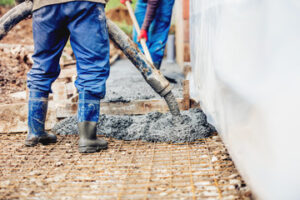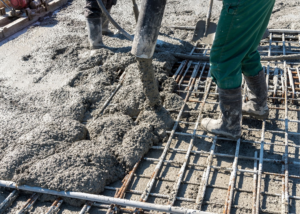Concrete Contractors have extensive experience with large-scale projects. They can help ensure that your project is completed on time and within budget. They also adhere to local building codes and regulations, reducing the risk of costly mistakes or fines.

When looking for a concrete contractor, make sure to ask friends and family members for referrals. Choosing a local contractor will save you money and improve transmission because they are familiar with the climate and building codes of your area.
When embarking on a concrete project, it is essential to select a contractor who is capable of meeting deadlines and staying within your budgetary constraints. While many concrete contractors are capable of handling various scopes of work, choosing the right contractor for your specific needs is a delicate process that involves several key considerations. To help you determine if a concrete contractor is qualified to take on your project, consider evaluating their experience, verifying credentials, and examining past work.
Inquire about the contractor’s experience working on concrete projects that are similar to yours in scope and objective. Ask for a comprehensive portfolio of past work, and review the quality of workmanship and aesthetics. Asking the contractor for references from past clients is another great way to assess their experience and expertise.
Verifying a contractor’s licensing and insurance coverage is another crucial element of the contracting process. Check that they are licensed to work on your type of project, and that their insurance covers the full cost of your construction, including workers’ compensation. In addition, ensure that they are bonded to cover the expenses related to any legal issues that may arise during the project.
A reliable contractor should be able to communicate your project’s requirements clearly and answer any questions in a timely manner. This will help to avoid misunderstandings and miscommunication, which can lead to delays or cost overruns. Inquire about the contractor’s availability and how soon they can begin your project, and establish a timeline for completion. This will allow you to plan other aspects of the construction project, and will ensure that your concrete project is completed in a timely manner.
A reliable concrete contractor will be able to provide you with a detailed written contract that outlines the price, materials that will be used, and when the project will be completed. This will help to prevent any misunderstandings and ensure that all parties are on the same page. It is also important to select a concrete contractor that is locally owned and operated. Local concrete contractors are more likely to be invested in ensuring their clients’ satisfaction, and are more likely to go above and beyond to meet your needs.
License
Concrete is one of the most used materials in contemporary construction. As a result, there is a strong demand for skilled and professional concrete contractors. Being a concrete contractor takes more than just passion; it requires extensive knowledge, meticulous attention to detail and a dedication to the craft. While it may seem tempting to save money and attempt a DIY project, hiring licensed concrete contractors is always the smarter choice. Not only do they know how to get the job done right, they also possess a thorough understanding of state regulations and building codes.
In order to become a licensed concrete contractor, you must pass the state licensing exam. The exam covers various aspects of concrete construction, including design and structural integrity. It is important to take the time to prepare for the exam, as this will increase your chances of success. Start by reviewing sample exams and practicing test-taking strategies. In addition, you should familiarize yourself with the required insurance and bonding requirements for your state.
To be a licensed concrete contractor in Florida, you must have general liability insurance and workers’ compensation. In addition, you must have a valid business license and pay the state’s gross receipts tax. You must also comply with any additional insurance and bonding requirements that are specific to your local jurisdiction.
Moreover, you must also meet the City of Winona’s specifications for constructing sidewalks, driveways, curbs and gutters. You must also submit to random testing for concrete mixtures, strength and consistency. You must hire an independent testing laboratory approved by the City to perform these tests.
Lastly, you must obtain a permit before beginning work. If you are not sure what type of permit you need, contact the City of Winona and ask for assistance. You must also provide a copy of your contractor’s license to the City of Winona when applying for a permit. If you fail to do so, your permit will be revoked. Additionally, you must pay a $25 re-testing fee if your test results are not passed. If you need to retest, you must notify the City of Winona before scheduling your re-testing.
Insurance
In addition to state business insurance requirements, it is important for concrete contractors to have their own tailored insurance policies. A reputable agent will understand the unique risks of this type of work and help you find a policy that meets your needs. You should also ask about the agent’s customer support. A good agent will answer your questions promptly and effectively.
While concrete contractors are responsible for some of the most important buildings and structures in our society, they can be exposed to several risks that require liability insurance coverage. For example, a contractor may be liable for accidents involving large machinery such as cement trucks. They may also be liable for damages to the property of third parties. Additionally, they may be held liable for employee injuries. In order to protect themselves against these risks, concrete contractors should have workers compensation and general liability insurance.
Insurance for concrete contractors can be expensive, so it is essential to shop around for the best rates. The cost of insurance for concrete contractors depends on the size of your business, the types of projects you take on, and the amount of coverage you choose to purchase.
General liability is an important form of insurance for concrete contractors, as it provides protection against claims made by third-parties. These claims can include bodily injury, property damage, and products-completed operations. Some clients will even require you to provide proof of general liability insurance before beginning the project.
If you are looking for a commercial auto insurance policy for concrete contractors, you should look for one that offers a high limit and low deductible. This will provide you with maximum coverage in the event of a loss. In addition, you should also look for a policy that covers tools and equipment. This will protect you against theft and damage to your equipment.
When hiring a concrete contractor, you should ask them for proof of insurance and their license. This will ensure that they are qualified to complete the job. You should also ask them about their previous projects and client references. Lastly, you should also ask about their warranty and post-project support. This will give you a better idea of their level of craftsmanship and professionalism.
Free Estimate
A quality concrete contractor will offer a free estimate, which is a document that provides the costs for materials and labor. The estimated cost will help you plan your budget and determine which contractors to choose. The estimate will also include any other expenses that may be associated with the project. When requesting an estimate, provide the contractor with as much detail as possible about your project. This will ensure that the estimate is accurate and reflects your specific needs.
A good contractor will also be able to discuss the project at hand in-depth and answer any questions you might have. This will give you an idea of their experience and the level of professionalism they display. If they don’t seem to be able to communicate effectively or don’t respond to your inquiries promptly, it might be best to consider other options.
Choosing the right concrete contractor is essential for ensuring that your project is completed on time and to your satisfaction. The key to finding a reputable contractor is to do your research and verify their licensing and insurance. In addition, it is helpful to request a free estimate and check references and past projects.
Local concrete contractors are more likely to have the necessary experience and expertise for your project. They are familiar with building codes and regulations and will be able to respond quickly to your requests. In addition, they will be able to offer personalized service and custom solutions.
Concrete is a versatile building material that can be used for a variety of applications. It can be molded to achieve any desired aesthetic and is a great option for home renovations. Whether you’re looking to add an elegant new driveway or create a beautiful outdoor patio, a concrete contractor can help.
Whether you’re interested in installing a new driveway or need to repair an existing one, it is important to hire a reputable contractor to avoid costly mistakes and to ensure that the work meets local standards. To find a qualified concrete contractor, start by researching contractors online and asking for recommendations from friends and family. Look for contractors with a strong BBB rating and positive reviews. Once you’ve narrowed down your list, ask for quotes from each contractor to compare prices and services.
